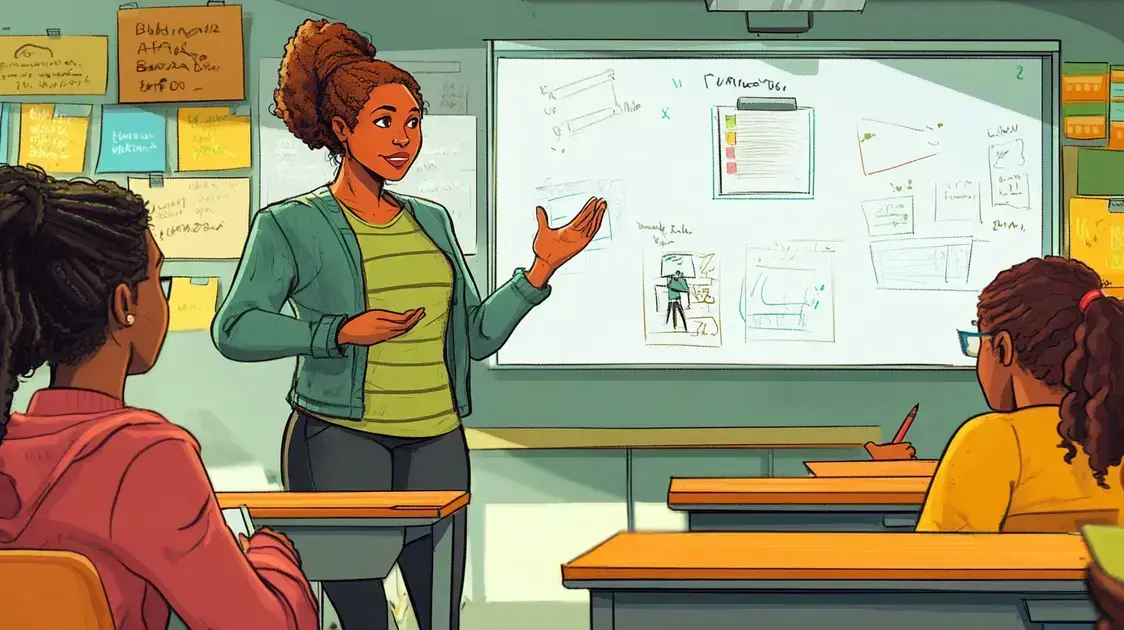To excel in teaching, possessing the right skills needed to be a teacher is crucial.
From effective communication to adaptability, these skills form the foundation of successful educators.
Whether handling classroom challenges or inspiring students, mastering these abilities ensures a thriving career in education. Explore the essential traits that define great teachers and transform your teaching journey.
Communication Skills for Teachers
Effective communication skills are essential for teachers to build a strong rapport with their students, colleagues, and parents. Teachers must express ideas clearly, ensuring they connect with diverse learners and address their different needs.
By using clear and concise language, educators can foster a learning environment where students feel heard and valued.
Engaging With Students
Teachers need to actively listen to their students, understanding their concerns and encouraging open dialogue. By doing so, they can create a classroom atmosphere that promotes trust and mutual respect.
Techniques like active listening, asking open-ended questions, and providing constructive feedback are fundamental to nurturing students’ participation and confidence.
Collaborating With Colleagues
Strong interpersonal skills are vital when working with fellow educators to develop lesson plans and share effective teaching strategies.
By maintaining clear and respectful communication, teachers can create a unified approach to addressing challenges and enhancing the students’ academic experience. Collaboration in meetings, projects, and workshops builds a supportive teaching community.
Interacting With Parents
Communication with parents is key to aligning on a student’s progress and addressing concerns constructively. Teachers should use consistent messaging through emails, phone calls, or parent-teacher conferences to ensure parents are informed and involved in their child’s education. Clear communication fosters trust and partnership in a student’s success.
Developing effective verbal and nonverbal communication skills not only enhances a teacher’s ability to convey information but also empowers them to inspire and connect with everyone involved in the educational journey.
Patience and Empathy in Teaching
Patience and empathy are foundational traits every teacher must possess to ensure a supportive and inclusive learning environment. These qualities enable educators to understand the unique challenges their students face and respond with compassion and care.
Patience is essential when working with students who learn at different paces or struggle with certain concepts.
Teachers often need to repeat instructions, modify lesson plans, or take additional time to clarify doubts without showing frustration. Remaining calm and composed in these moments builds trust and allows students to progress without fear of judgment.
Understanding Students’ Perspectives
Empathy helps teachers step into their students’ shoes to grasp their emotional and academic struggles.
Whether a student is dealing with personal issues, peer pressure, or learning difficulties, empathizing with their situation fosters connection and motivates both teacher and student to work collaboratively towards solutions.
Building Strong Relationships
When teachers prioritize patience and empathy, they can better connect with their students, forming long-lasting relationships built on respect and understanding.
These bonds help create a safe space where students feel encouraged to share their thoughts, ask questions, and explore their creativity without fear of failure.
By adopting these qualities, teachers inspire students to develop self-confidence, self-awareness, and resilience. This approach ensures that learning becomes a supportive and enjoyable journey rather than a source of pressure or discomfort.
Adaptability in the Classroom

Adaptability is a crucial skill for teachers as it allows them to respond effectively to unexpected challenges in the classroom. Educators must be ready to adjust teaching methods, lesson plans, and strategies to meet the diverse needs of their students or accommodate changes in the learning environment.
One of the main ways teachers demonstrate adaptability is by catering to different learning styles. Some students may learn best through visual aids, while others benefit from hands-on activities or verbal explanations. Adapting to these preferences ensures every student has the opportunity to thrive.
Handling Unexpected Situations
In the classroom, unexpected situations such as technical issues or disruptions can arise at any moment. Teachers who are adaptable can think on their feet and modify their plans without losing momentum. For instance, if a digital resource fails, they might shift to a discussion or a creative group activity to continue the lesson smoothly.
Adapting to Individual Needs
Every classroom is filled with students who have unique challenges, such as language barriers, learning disabilities, or emotional struggles.
Adapting to these needs requires flexibility and a willingness to try different approaches, such as breaking down instructions into simpler steps or offering additional resources to support learning.
Adaptable teachers also adjust to larger-scale changes, such as shifts to remote learning or the introduction of new education policies.
By staying open to continuous learning and innovation, educators can maintain their effectiveness and inspire students to embrace change as a positive part of growth.
Organizational Skills Every Teacher Needs
Organizational skills are vital for teachers to effectively manage their responsibilities and create a structured learning environment.
Balancing lessons, assessments, and administrative tasks requires careful planning and prioritization to ensure that every aspect of teaching runs smoothly.
One essential aspect of organizational skills is lesson planning. Teachers must create detailed lesson plans outlining objectives, learning activities, and evaluation methods while keeping their schedules flexible enough to adjust to unforeseen changes.
By having a clear structure, teachers can maintain focus and guide their students toward achieving academic goals.
Time Management Strategies
Time management is equally important for teachers juggling multiple tasks. Allocating specific times for grading, planning, and attending meetings helps avoid last-minute stress.
Using tools such as calendars, planners, or digital apps can aid in tracking deadlines and staying organized throughout the school term.
Classroom Organization
A well-organized classroom contributes to a productive learning environment. Teachers should arrange materials, supplies, and resources in a way that allows quick and easy accessibility for both themselves and their students.
Labeling items, maintaining orderly desks, and setting clear routines help minimize distractions during teaching time.
Strong organizational skills also extend to managing student data, such as tracking attendance, assignments, and performance records. Keeping these records accurate and updated helps teachers identify areas requiring additional attention and communicate effectively with parents and administrators.
By mastering organizational skills, teachers can reduce stress, improve productivity, and focus fully on fostering a supportive learning environment for their students.
Leadership and Classroom Management
Leadership and classroom management are integral to creating a productive and harmonious learning environment. Teachers act as leaders who guide and inspire students while establishing rules and routines that foster respect and cooperation.
Effective leaders set clear expectations and model the behavior they wish to see in their students. This includes showcasing responsibility, integrity, and enthusiasm for learning.
When teachers lead by example, they instill these values in their students, promoting a classroom culture where everyone feels motivated and engaged.
Establishing Clear Rules and Expectations
Strong classroom management begins with setting boundaries and creating a transparent structure. Teachers should communicate rules at the start of the academic year and consistently enforce them. Clear expectations provide students with stability, helping them understand the importance of discipline and mutual respect in the classroom.
Addressing Challenges Calmly
Conflict resolution is another key aspect of leadership. Teachers need to handle disruptions or disputes calmly and fairly.
Maintaining composure and using positive reinforcement can help correct misbehavior while reinforcing desired actions. Proactively addressing challenges creates a secure and focused learning environment for all.
Leadership also involves empowering students to take ownership of their learning. By delegating responsibilities, such as group tasks or classroom roles, educators encourage students to develop independence and teamwork skills. These opportunities foster a sense of belonging and personal accountability.
By mastering leadership and classroom management skills, teachers cultivate a structured yet empathetic space where students feel supported and thrive both academically and personally.
Passion for Lifelong Learning

Passion for lifelong learning is a core trait of exceptional teachers, as education is an ever-evolving field that requires continuous growth. By embracing new knowledge, innovative methods, and diverse perspectives, educators ensure that both they and their students remain engaged in the learning process.
One way teachers demonstrate this passion is by staying informed about advancements in education. Whether attending workshops, pursuing certifications, or exploring academic research, they consistently seek opportunities to enhance their skills and adapt to modern teaching practices. This willingness to learn directly benefits students, who gain access to fresh ideas and updated resources.
Modeling the Love of Learning
Teachers with a mindset of lifelong learning inspire their students to adopt the same approach.
By showing excitement for discovery and curiosity, they encourage students to see learning as a rewarding and fulfilling journey rather than a static obligation.
Sharing personal stories about their learning experiences or introducing thought-provoking materials can foster this mindset in the classroom.
Embracing Change and Innovation
In an age where technology and global trends shape education, lifelong learning enables teachers to embrace change and integrate new tools effectively.
This might include experimenting with digital platforms, adopting alternative teaching strategies, or applying creative problem-solving techniques to address emerging challenges in education.
Remaining open to personal and professional growth also helps teachers navigate diverse classroom dynamics and cultural perspectives.
By continually expanding their knowledge base, they stay adaptable and prepared to meet the needs of all learners while modeling the incredible value of lifelong education.
Problem-Solving and Critical Thinking
Problem-solving and critical thinking are essential skills for teachers to navigate complex classroom scenarios and inspire students to approach challenges with a strategic mindset. These abilities empower educators to foster creativity, independence, and resilience in their students while addressing real-world issues effectively.
Teachers often encounter diverse problems, such as managing classroom conflicts, tailoring lessons to meet varied learning styles, or identifying solutions for gaps in academic performance.
Strong problem-solving skills enable them to analyze these situations, identify the root cause, and implement practical strategies that promote positive outcomes.
Encouraging Critical Thinking in Students
Critical thinking is a skill teachers both practice and teach. They create activities that prompt students to evaluate evidence, form logical arguments, and make informed decisions.
Techniques such as open-ended discussions, case studies, and collaborative group work push students to go beyond surface-level understanding and explore deeper connections between ideas.
Adapting to Dynamic Challenges
In a classroom setting, no two days are the same, and unexpected difficulties can arise at any time.
Teachers with problem-solving skills adapt quickly by brainstorming creative solutions, whether it’s a new instructional method to clarify difficult concepts or a fresh approach to engage a disengaged student. Flexibility and a proactive mindset are keys to success in these situations.
By modeling these skills, teachers also show students the importance of approaching obstacles with a solution-oriented attitude. This not only helps learners thrive academically but also equips them with crucial life skills needed to succeed outside the classroom.
Focusing on problem-solving and critical thinking prepares students to tackle challenges confidently and effectively throughout their lives.
Skills Needed to Be a Teacher: Final Considerations
Becoming a successful teacher requires a combination of essential skills such as communication, patience, empathy, adaptability, and organizational expertise.
Each of these skills contributes to creating a nurturing and effective learning environment where students feel supported and inspired.
Leadership abilities and classroom management ensure a structured yet engaging atmosphere, while a passion for lifelong learning keeps teachers adaptable and innovative in their approach.
Strengthening problem-solving and critical thinking skills enables educators to overcome challenges and guide students in developing these abilities themselves.
By honing these qualities, teachers not only enhance their professional growth but also impact their students’ academic journey positively.
These foundational skills pave the way for success, fostering well-rounded individuals ready for the challenges of the world. Embrace these skills to bring excellence to both teaching and learning.
